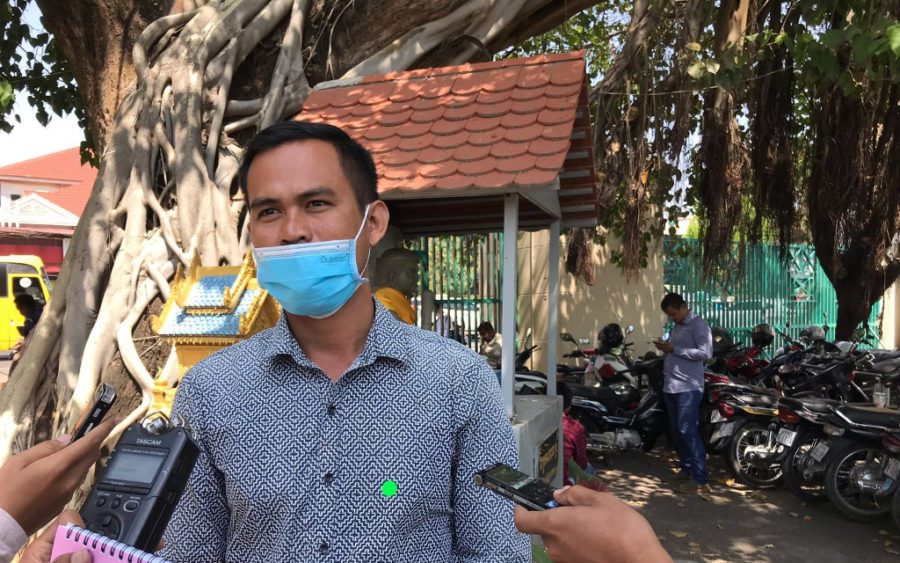The Phnom Penh Municipal Court questioned two opposition activists over a leadership workshop in Malaysia in 2019 as well as comments made about regional protest movements by CNRP co-founder Sam Rainsy.
Presiding Judge Ros Piseth was scheduled to question four former CNRP members on Thursday, but only Hy Sokchea and Nov Vichet were present at court, while the other two, Ney Leak and Chea Chiv, could not attend. The activists are part of a group of 60 opposition defendants charged with incitement and plotting related to the failed return of the CNRP co-founder Sam Rainsy in 2019, with the trial picking up from last month’s questioning of Heng Chan Sothy and Kak Komphear. It is one of four opposition trials currently before the Phnom Penh court.
Former CNRP youth leader Hy Sokchea, 34, told the court that he had participated in a two-day training session in Malaysia once in 2019, which focused on youth leadership and participation in the political sphere. Sokchea, from Prey Veng province, said he couldn’t remember what organization hosted the training, or who invited him except that it was a Khmer Muslim man living in Malaysia.
There were about 30 to 40 participants in the workshop, and CNRP leaders Sam Rainsy, Mu Sochua and Eng Chhai Eang also made a short appearance at the beginning of the session, Sokchea said. However, they gave no political speeches, he said.
“Frankly speaking, I went along, [but] because I don’t speak any foreign language, I studied only two hours,” Sokchea said, adding that he got sick from the food and couldn’t participate any longer.
Sokchea recalled that he was arrested about 10 days after he returned from Malaysia, and that he already confessed to authorities in a video posted to social media.
He said he still wondered why he was being charged even though he had cooperated with authorities.
Deputy prosecutor Seng Heang probed Sokchea further on the training, holding up photos he said were presented at the session.
“The evidence shows that [the photos presented] were from Hong Kong and the topic was related to demonstrations in Hong Kong, and [the workshop] was to mainstream all of you to implement [demonstration] plans in Cambodia,” Heang said. Sokchea repeated that he didn’t remember the training details, as he was sick and couldn’t speak English.
The judge further questioned Sokchea on whether he spoke with former CNRP members, received plans from party leaders or saw inciting posts on Facebook and other social media.
He said he just knew of Rainsy’s plan to return through the media but he had not received any direct order from CNRP leaders.
“There is a post asking [people] to protest against the [Cambodian] government like in Thailand and Hong Kong. Have you seen those posts?” Piseth asked the former opposition youth leader.
Sokchea responded: “I have no time to follow the news. I am busy in business. I have very little time to check Facebook.”
The prosecutor pushed Sokchea on a Facebook post he made in the past, in which he promised to accompany Rainsy as well as CNRP president Kem Sokha, but he said this post was made “a long time before” Rainsy announced his 2019 return attempt.
“Now, I am not a CNRP member. [Rainsy] is guilty so I have no reason to accompany him,” Sokchea said.
Heang asked Sokchea whether Rainsy’s plan was illegal.
“I think it is not right. That’s why I didn’t participate. But whether it is illegal or not, I don’t know because I am not a lawyer,” he responded.
Defense lawyer Sam Sokong asked his client whether he thought Rainsy’s comments could mobilize the military to topple the government.
Sokchea said he just wanted the exiled party leader to return peacefully, without inciting any violence, adding: “I think that there is no [way it could mobilize the military], not even a little. There is no force or ability to do so. … It is just the language that politicians have used.”
Later in the hearing, Vichet — a former elected member of the Boeng Salang commune council in Phnom Penh’s Toul Kork district — denied any connection to former senior leaders or to the party’s Phnom Penh executive committee chair Morn Phalla, though he acknowledged a few former colleagues among a list of names read out by the prosecutor.
Vichet said he had never been overseas and abandoned his position since the party was dissolved in 2017, but he still met some of his former colleagues at coffee shops, mostly by chance.
Judge Piseth asked, “Have you ever seen Sam Rainsy’s appeals to the people to stand up and topple the government? Haven’t you?”
But Vichet said he was unclear on the leader’s messages, saying he just looked for photos and didn’t know how to share or chat.
The judge questioned him on posts by Rainsy telling soldiers to “turn their guns,” but Vichet also deferred in giving his interpretation.
“If he used the words about participating to find a solution and participating in peaceful conversation, this is more accurate … but the use of these words is his right,” Vichet said. “I don’t know whether it is wrong or right.”
The trial is set to continue on February 25.












